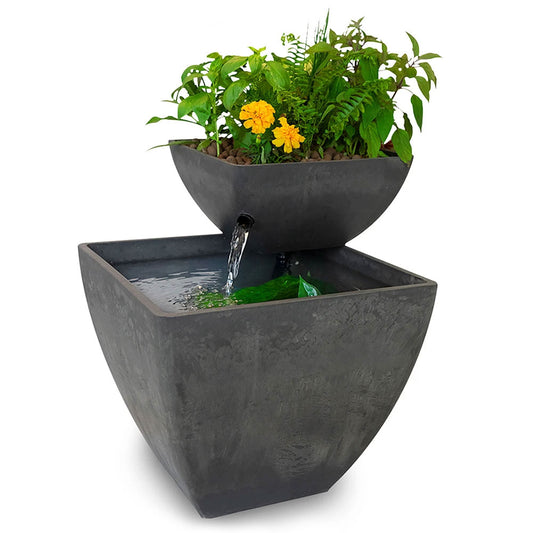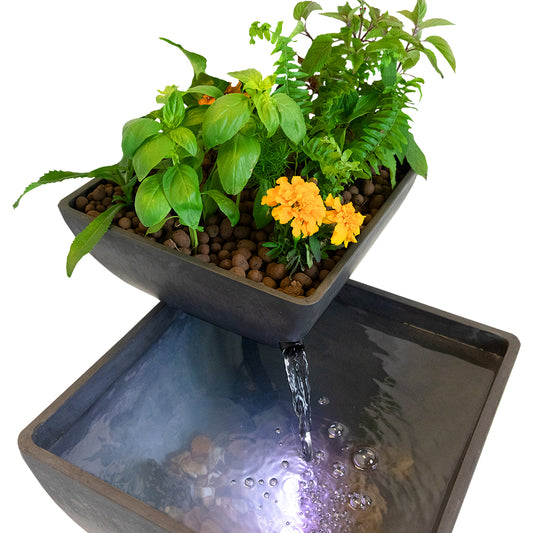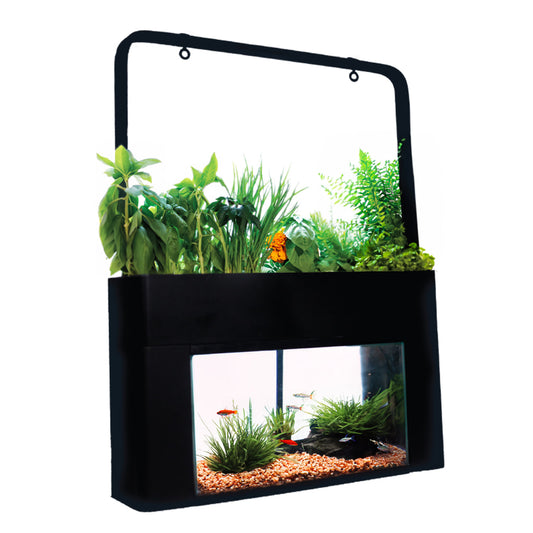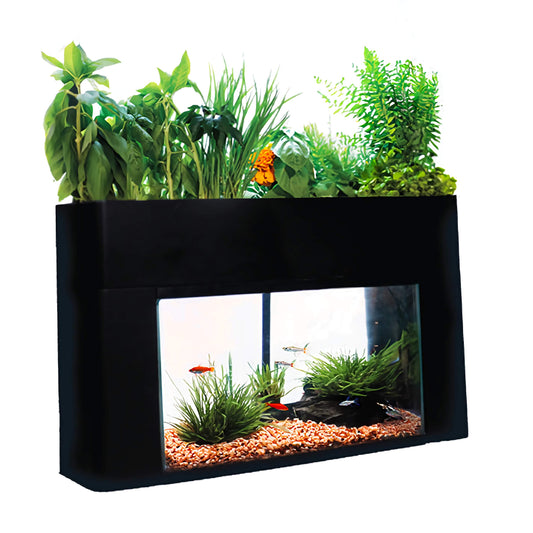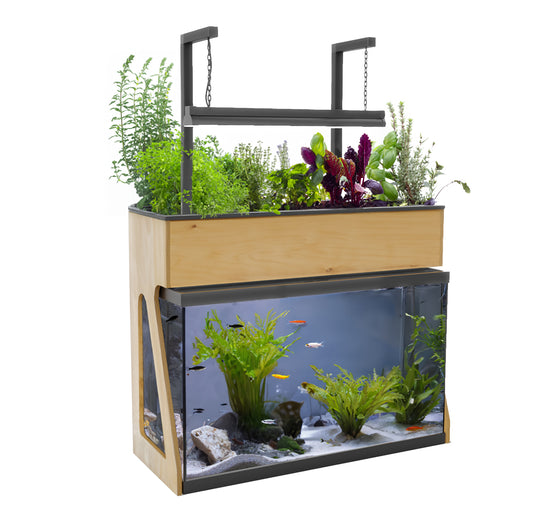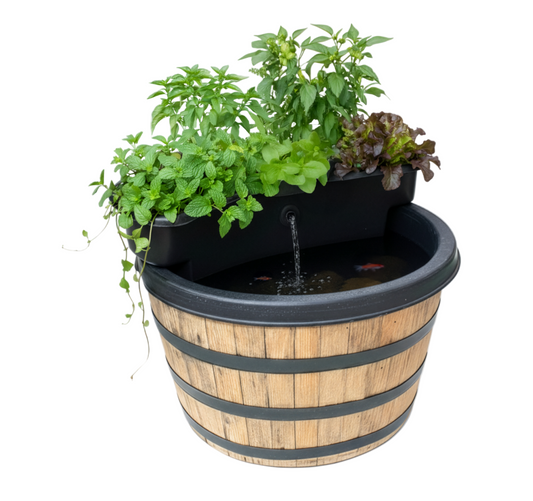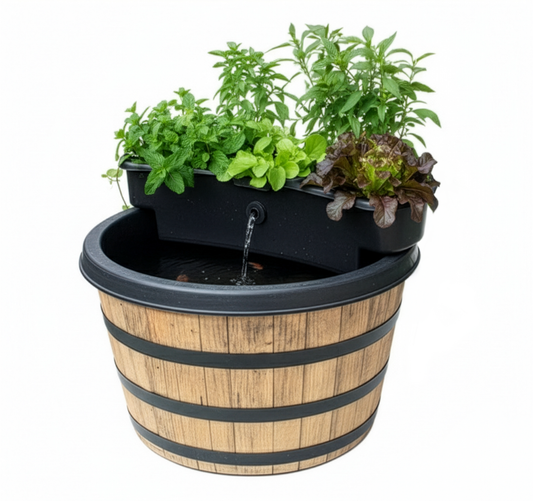Vitamin C's Crucial Roles for Fish AND Plants in Aquaponics
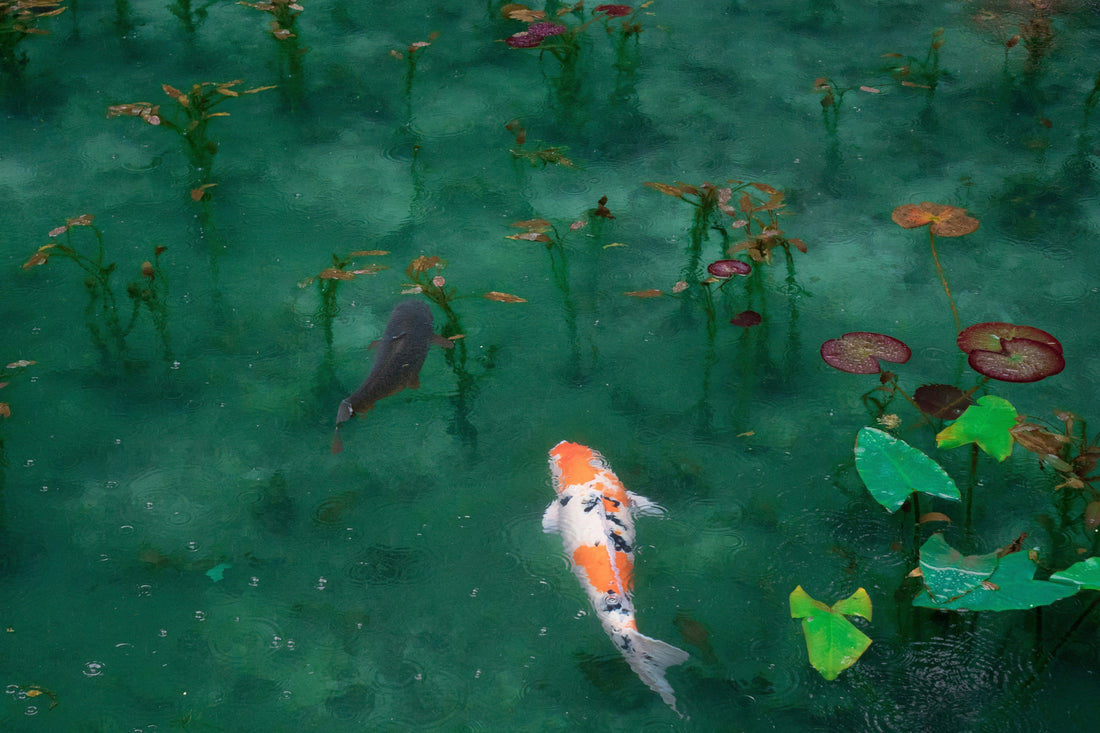
We often associate Vitamin C with keeping ourselves healthy, perhaps picturing citrus fruits or supplements to ward off colds. But this essential nutrient, also known as ascorbic acid, is a powerhouse molecule with critical functions extending far beyond human health. In the dynamic ecosystem of an aquaponics system like the AquaSprouts Garden, Vitamin C plays vital, multifaceted roles in ensuring the well-being and resilience of both your fish and your plants.
Interestingly, while plants can typically synthesize their own Vitamin C, many fish species commonly raised in aquaculture and aquaponics – including popular choices like catfish, carp, trout, and tilapia – cannot. They lack a key enzyme (L-gulonolactone oxidase) needed for its production. This makes dietary intake absolutely essential for these fish. Let's explore the indispensable contributions of Vitamin C to the health of your aquatic companions and your thriving greens.
Vitamin C: Championing Fish Health
For fish reliant on dietary sources, adequate Vitamin C is non-negotiable for growth, immunity, and overall vitality.
1. The Immune Guardian: Bolstering Fish Defenses
Mirroring its function in humans, Vitamin C is a cornerstone of a robust fish immune system. It actively supports diverse cellular functions within both the innate (non-specific) and adaptive (specific) immune responses. Sufficient Vitamin C intake demonstrably:
- Enhances Phagocytic Activity: Boosts the ability of specialized immune cells (like neutrophils and macrophages) to engulf and destroy invading pathogens.
- Increases Respiratory Burst: Improves the process where immune cells generate reactive oxygen species (ROS) – molecular weapons – to kill microbes effectively.
- Strengthens Complement Activity: Enhances the complement system, a cascade of proteins crucial for flagging and eliminating pathogens.
- Supports Antibody Production: May enhance the proliferation and differentiation of B-cells and T-cells, potentially leading to increased production of vital antibodies like IgM.
- Improves Disease Resistance: Numerous studies confirm that fish supplemented with Vitamin C exhibit significantly higher survival rates when facing challenges from common bacterial pathogens such as Aeromonas hydrophila, Vibrio harveyi, and Streptococcus agalactiae.
Some research even suggests Vitamin C can be strategically used as a short-term immunostimulant, perhaps before anticipated stressful events like handling, transport, or seasonal temperature shifts, providing an extra defensive boost. Conversely, a deficiency severely impairs immune function, lowering complement levels and leaving fish vulnerable to infections and stress.
2. Building Blocks for Growth and Repair: The Collagen Connection
Vitamin C is absolutely indispensable for the synthesis of collagen, the most abundant structural protein in fish. Think of collagen as the body's essential scaffolding, providing the framework for:
- Connective Tissues: Giving structure and support throughout the body.
- Skin and Scales: Maintaining the integrity and strength of the fish's vital outer protective layers.
- Bones: Ensuring proper skeletal development, growth, and strength.
- Wound Healing: Facilitating the efficient repair of damaged tissues after injury or infection.
Vitamin C acts as a crucial helper molecule, or cofactor, for the hydroxylase enzymes responsible for modifying pro-collagen precursors into functional collagen. Without adequate Vitamin C, this process falters, leading to severe consequences like stunted growth, skeletal deformities (such as spinal curvature – lordosis/scoliosis – or cranial abnormalities like "broken skull"), and significantly impaired wound healing. Optimal dietary levels are essential to maintain stable collagen synthesis rates.
3. Unlocking Nutrients: The Iron Link
Iron is another mineral critical for fish health, most notably for forming hemoglobin, the molecule responsible for transporting oxygen in the blood. While fish consuming other animals ingest readily absorbable heme iron, aquaculture feeds often incorporate plant-based ingredients (like soy or corn meal). These plant sources contain non-heme iron, which is generally less bioavailable. Vitamin C plays a key role here by facilitating the absorption of this non-heme iron. Its potent reducing ability converts the less soluble ferric iron (Fe3+) into the more soluble and readily absorbable ferrous iron (Fe2+) form. Thus, adequate Vitamin C in the diet helps fish maximize iron uptake from their feed.
4. The Stress Shield: Antioxidant Power
Aquaponics environments, while generally stable, can occasionally present stressors for fish – fluctuations in temperature or dissolved oxygen, handling, or even minor water quality shifts. These situations can trigger oxidative stress, an imbalance where harmful reactive oxygen species (ROS) overwhelm the fish's natural defenses, leading to cellular damage. Vitamin C is a primary water-soluble antioxidant in fish, safeguarding cells and tissues (including the skin and scales) from this oxidative onslaught. It directly neutralizes damaging ROS and also helps regenerate other crucial antioxidants like Vitamin E. By bolstering these antioxidant defenses, Vitamin C significantly enhances fish tolerance to environmental stressors, contributing to overall resilience and health.
Vitamin C: Supporting Plant Vigor in Aquaponics
While fish often need Vitamin C from their diet, plants are typically masters of producing their own. This doesn't diminish its importance; rather, it highlights how fundamental Vitamin C is to plant life. In your aquaponics system, the Vitamin C synthesized by your plants contributes significantly to their health, growth, and ability to thrive.
1. The Plant Protector: Antioxidant and Stress Resilience
Plants, especially in sunny spots, are constantly managing the oxidative stress that comes with photosynthesis and exposure to environmental factors like varying light intensity, temperature changes, or even nutrient fluctuations. Vitamin C is a frontline defender:
- ROS Scavenging: It's a potent antioxidant found throughout plant cells, neutralizing harmful ROS like hydrogen peroxide (H2O2), superoxide radicals (O2-), hydroxyl radicals (OH-), and singlet oxygen (1O2) generated during metabolism and stress.
- Photoprotection: Vitamin C is crucial for protecting the photosynthetic machinery from damage caused by excess light. It's involved in the water-water cycle (via ascorbate peroxidase) to detoxify H2O2 in chloroplasts and acts as a cofactor for violaxanthin de-epoxidase in the xanthophyll cycle, which safely dissipates excess light energy as heat.
- Stress Tolerance: Its antioxidant capacity helps plants cope with various abiotic stresses (drought, salinity, temperature extremes) by mitigating oxidative damage and participating in stress signaling pathways.
2. Architect of Growth: Cell Division and Structure
Vitamin C is deeply involved in the fundamental processes of plant growth and development:
- Cell Division and Expansion: It regulates cell division and is essential for cell growth.
- Cell Wall Synthesis: Analogous to its role in animal collagen, Vitamin C acts as a cofactor for prolyl hydroxylase enzymes in plants. These enzymes modify hydroxyproline-rich glycoproteins (HRGPs), crucial structural components of the plant cell wall. This ensures the cell wall's integrity and flexibility, necessary for growth and maintaining plant structure. Interestingly, the biosynthetic pathways for Vitamin C and some cell wall components share common precursors like GDP-D-mannose, highlighting an intimate metabolic link.
- Hormone Biosynthesis: It acts as a cofactor for enzymes involved in synthesizing important plant hormones like gibberellins and ethylene, which regulate various aspects of growth and development.
3. Facilitating Plant Nutrition: Internal Iron Management
While fish benefit from Vitamin C enhancing dietary iron absorption, plants utilize Vitamin C's reducing power for internal iron management. Iron is vital for chlorophyll synthesis and electron transport. Vitamin C helps:
- Maintain Enzyme Activity: It keeps the iron atoms in numerous essential iron-dependent enzymes (like dioxygenases) in the active, reduced Fe2+ state.
- Mobilize Stored Iron: Plants often store iron as Fe3+. Vitamin C can reduce this stored iron to the more mobile Fe2+ form, making it available for transport and use, particularly during critical stages like seed germination.
Healthy, robust plants are essential for the aquaponics cycle, efficiently filtering water and providing produce. Vitamin C is a key internal factor supporting that plant health.
Treating Your Water Naturally with AquaSprouts Dechlorinator
Maintaining pristine water quality is fundamental in any aquaponics system. Tap water often contains chlorine or chloramines, disinfectants added to make water safe for humans but which are harmful to fish and the beneficial bacteria essential for the nitrogen cycle in your system. Fortunately, there's a natural and beneficial way to treat your water: the AquaSprouts Natural Water Dechlorinator.
This dechlorinator leverages the power of Vitamin C (ascorbate), a natural compound, to effectively and rapidly neutralize both chlorine and chloramines. Unlike some sulfur-based chemical dechlorinators, Vitamin C treatment doesn't significantly deplete dissolved oxygen levels, which is crucial for healthy fish. The AquaSprouts formulation is food-safe and non-toxic to fish, invertebrates, live plants, and the vital microbes in your biofilter, making it perfectly suited for aquaponics ecosystems.
But the benefits don't stop there! By using a Vitamin C-based dechlorinator, you're also adding a vital nutrient directly to the water. As we've discussed, many fish cannot produce their own Vitamin C and require it for numerous functions, including immune support, collagen production, and stress resistance. Using the AquaSprouts Natural Water Dechlorinator acts as an additional source of this essential vitamin for your fish. Plus, it includes Aloe Vera to help enhance your fish's natural protective slime coat. Choosing this natural dechlorinator is a safe, effective way to prepare your tap water while providing an extra health boost for your aquatic companions.
A Vital Nutrient
From bolstering fish immunity and building strong bodies to enhancing plant growth and stress resilience, Vitamin C is undeniably critical for a thriving aquaponics system. For the many fish species unable to synthesize it, a consistent dietary supply is a necessity, not a luxury. For plants, their own production of Vitamin C fuels essential processes for growth and protection. Ensuring your fish receive adequate Vitamin C through quality feed, and using a natural, beneficial water treatment like the AquaSprouts Natural Water Dechlorinator, supports the health of both your fish and plants. This simple yet powerful nutrient is a key player in ensuring your aquaponics ecosystem doesn't just survive, but truly flourishes.
Resources & Citations
- Vitamin C: An Important Nutritional Factor in Fish Diets – ResearchGate
- Effects of Dietary Vitamin C on Growth, Antioxidant Activity, and Disease Resistance of Fish – ResearchGate
- Vitamin C and Fish Immunity – PubMed
- Vitamin C Supplementation to Optimize Growth, Health, and Stress Resistance in Aquatic Animals – ResearchGate
- Vitamin C Overview – NCBI Bookshelf

